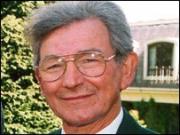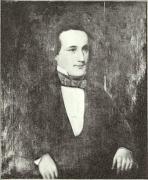|
|
||||||||||||||||||||||||
 |
Featured person
Recently added |
Bertie Peacock (1928 - 2004): |
||||||||||||||||||||||

|
| Bertie Peacock |
Bertie Peacock was one of the most popular and successful football players in Northern Ireland in the mid-20th century, a member of the generation which included such figures as Danny Blanchflower and his brother Jackie, Billy Bingham and Harry Gregg; he was a member of the celebrated squad which participated in the 1958 World Cup Finals. He was later a team manager, administrator and committed promoter of youth football.
John Robert Peacock was from Coleraine, County Londonderry, one of seven children. He was a plumber by trade, but as he later recalled, he loved football and would play anywhere he could, local boys' clubs, his school, the local YMCA. In May 1947 the eighteen-year old Peacock made his first appearance for the local Irish League club, Coleraine FC (the Irish League is the leading domestic league in Northern Ireland only, despite the name). A scout working for Glentoran, a top Belfast football club soon spotted him and he moved there in 1948, where he found himself among some of Northern Ireland's leading players. Talent spotted again, the following year he was invited to join Glasgow Celtic, one of the two major clubs in Scotland (known as the "Old Firm") in a football league of considerably larger scale than Northern Ireland's. This meant turning professional, at that time not possible in Northern Ireland. And so, he moved to Glasgow - a significant step in his football life, though probably not in other aspects, as Glasgow and Belfast are strikingly similar cities, in all sorts of positive and negative ways, and virtually face each other across the Irish Sea.
He made his first appearance for Celtic on 31 August 1949, and by the following year was a fixture in the side, playing left-side midfield or defence. His characteristics as a player were his high workrate, which would earn him the nickname "Little Ant" (he was not, at five feet and six inches, particularly big; he had another sobriquet, the "wee man"); also tenacious tackling, excellent close control, and good dribbling skills. He was a level-headed and selfless player, and highly popular, well-mannered person, which were ideal characteristics to make him selected as team captain to replace Jock Stein, one of Scotland's legendary footballers.
In his Celtic career, which lasted until 1961, his playing statistics were 318 Scottish League appearances with 33 goals; 56 Scottish Cup appearances with 7 goals, and 79 Scottish League Cup appearances with 10 goals. During his time, the club's honours were Scottish League champions 1954; Scottish Cup winners 1951 and 1954; and Scottish League Cup winners 1957 and 1958. In the 1957 final of the League Cup, Celtic not only won, but Peacock was captain, they won 7-1, a very high score, and they beat their city rivals, Rangers. They also won some minor trophies.
Though a professional player, his income was far from the "galactic" earnings such players enjoy in the 21st century, quite apart from the risk of injury or other difficulty to end a playing career. Peacock accordingly took the precaution of a fall-back trade. He described that although in Northern Ireland he had been a plumber, he decided to train as a welder. On one occasion his protective mask was defective and he woke up one Saturday totally unable to see. He informed the manager he would be unable to play, but by kick-off he had totally recovered and even scored two goals. Nonetheless he was summoned before the manager, who exonerated him as long as he gave up welding. The club found him alternative employment as a physical education instructor.
One notable detail about Peacock playing for Glasgow Celtic was that this club was and is predominantly Catholic, with a large element of specifically Irish Catholic, support, whereas Peacock was a Northern Irish Protestant, and Ulster-type sectarianism - to be exact, the negative actions stemming from this - can arise on and off the pitch. This most especially occurs when Celtic play against their Glasgow rivals, Rangers, an equally big club, if not larger, and manifestly Protestant where Celtic is Catholic. Peacock, though, while dismissive of what he called the "morons" who provoke sectarian clashes, said that he personally never experienced any such difficulty. "'It certainly didn't go on in my day, I can tell you that," he told an interviewer years later.
Peacock's international career ran throughout the 1950s, his first appearance being a home defeat against Scotland on October 6, 1951. It included a friendly match in Belfast in 1955 between Great Britain and the Rest of Europe; this was an occasional fixture to mark special events, in this case the 75th anniversary of the founding of the Irish Football Association. However, almost legendary status is accorded in Northern Ireland to the team which competed in the 1958 World Cup Finals in Sweden. Northern Ireland had qualified for the first time, against opposition including Italy, twice World Cup winners and one of the world's leading teams. At the Finals, though representing one of the smallest nations by population, Northern Ireland progressed to the second round of the competition, which was widely acknowledged internationally as a considerable achievement. Peacock missed due to knee injury the quarter-final in which Northern Ireland were eliminated by France; nevertheless he later recalled the tournament as a "fantastic experience". His last appearance for Northern Ireland was in Belfast on 7 October 1961, the almost-tenth anniversary of his debut, and another defeat by Scotland, this time even heavier. And this for one of the stars of the Scottish football world.
In 1961 he left Celtic and moved back to Ulster, despite several offers from clubs on the mainland, to become -manager of his former club, Coleraine FC. During his long term there he brought at first slow but sure improvements to the club's record, notably the Irish Cup in 1965 and 1972, but eventually, for the first time, Coleraine won the Irish League in 1974, these being highlights of a generally improved record. One outcome of their Cup win in 1965 was qualification for the European Cup-Winners' Cup, in which Coleraine were drawn against one of the most powerful teams in Europe, Dynamo Kiev of the USSR. The two-leg home-and-away format saw Coleraine the first British team to compete in the USSR and Kiev the first USSR side to play in Northern Ireland.
Peacock was also manager of the Northern Ireland national team, from 1961 until 1964, during which time he selected for their first appearances George Best, who became a forward of international renown, and Pat Jennings, who would achieve the same acclamation as a goalkeeper, including at one stage being the world record holder for international appearances.
In 1982, Northern Ireland qualified for the World Cup Finals again, for the first time since 1958. Once more the smallest footballing nation, they again made international headlines by qualifying for the second round, especially as they defeated the host nation, Spain. Their manager was Billy Bingham, one of the 1958 stars (Northern Irish fans would call each of those players a star) and one of his assistants was another of them: Bertie Peacock.
This had brought Peacock out of retirement; he had established a bar in Coleraine (which he later sold to be able to concentrate more on golf), but the lure of football still acted and, with two local football coaches, founded an international youth tournament, the Milk Cup, in 1983. This tournament, held typically in July each year in and around Coleraine, was successful from its inception and expanded to include, by 2011, three separate divisions (by age) and to feature many young players who would become international stars and to become leading players at the best clubs in the world, such as Bayern Munich of Germany, Barcelona of Spain and England's Manchester United. Peacock himself commented: "You can be anywhere in the world and meet someone who has been to the Milk Cup. That's priceless!" And they all passed through Coleraine. (Amongst other civically-minded actions was that he also helped set up a drop-in centre in the town.) The contemporary visitor to Coleraine will find, prominent at the north-west corner of The Diamond, its main square, a statue to Peacock, unveiled in July 2007, at the start of that year's Milk Cup. In 2006, a youth football club, Bertie Peacock Youths, was formed and named for him.
Northern Ireland's most distinguished football writer, who knew Peacock throughout his career, wrote of him:
"Never once did I hear him make a disparaging remark about anyone or criticism ever levelled at himself. He was, as they say, a nice man - soft spoken, mild mannered, generous, helpful and filled with satisfaction that the Northern Ireland Milk Cup youth tournament in which he had a vital baptismal role, was such a world acclaimed success."
Peacock was appointed MBE in 1986 and died in hospital Belfast following an operation.
| Born: | 29 September 1928 |
| Died: | 22 July 2004 |
| Richard Froggatt |
| Acknowledgements: Wesley McCann |
| Bibliography: Dictionary of Irish Biography; Glasgow Herald 23.7.04; www.colerainefc.com; www.nimilkcup.org; http://www.celticfc.net/; Malcolm Brodie: "The ‘wee man' was a true Coleraine legend", thcelticwiki.com; Malcolm Brodie: 100 Years of Irish Football; obituary, The Guardian |


Home | Our Policies | Plaques | Browse | Search | Sponsors | Links | Help | Contact
Privacy & Disclaimer | Cookie Policy | Site Map | Website Design By K-Point
© 2024 Ulster History Circle









